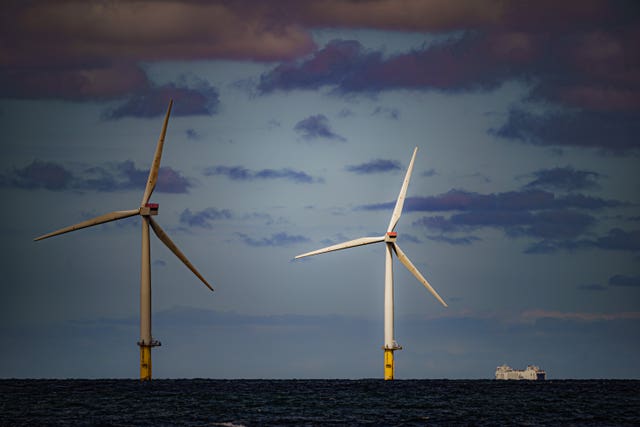
Oli Dugmore 4am - 7am
27 January 2023, 16:24

Rare earth minerals, also called rare earth elements, are described as “relatively abundant” by the US Geological Survey.
The world has enough rare earth minerals and other critical raw materials to switch from fossil fuels to renewable energy to produce electricity and limit global warming, according to a study.
With a push to get more electricity from solar panels, wind turbines, hydroelectric and nuclear power plants, concerns have been raised that there will not be enough key minerals to make the decarbonisation switch.
Rare earth minerals, also called rare earth elements, are described as “relatively abundant” by the US Geological Survey.

They are essential for the strong magnets necessary for wind turbines, and also show up in smartphones, computer displays and LED lightbulbs.
The new study looks at those elements and 17 other raw materials required to make electricity that include some common resources such as steel, cement and glass.
A team of scientists looked at the materials — many not often mined heavily in the past — and 20 different power sources. They calculated supplies and pollution from mining if green power surged to meet global goals to cut heat-trapping carbon emissions from fossil fuel.
Much more mining is needed, but there are enough minerals to go around and drilling for them will not significantly worsen warming, the study in the scientific journal Joule concluded.
“Decarbonisation is going to be big and messy, but at the same time we can do it,” said study co-author Zeke Hausfather, a climate scientist at the tech company Stripe and Berkeley Earth.
“I’m not worried we’re going to run out of these materials.”
Much of the global concern about raw materials for decarbonisation has to do with batteries and transportation, especially electric cars that rely on lithium for batteries. This study does not look at that.
Looking at mineral demands for batteries is much more complicated than for electric power and that is what the team will do next, Mr Hausfather said. The power sector is still about a third to half of the resource issue, he added.
A lot depends on how fast the world switches to green energy.
The energy transition will require mining lots of materials, even if we pursue smart strategies around public transit and minimizing need for large vehicles.
But its helpful to have some perspective here; lithium mining is a drop in the bucket compared to fossil fuel mining: https://t.co/kEa2cSp0Kb pic.twitter.com/IP7GBQIkvp
— Zeke Hausfather (@hausfath) January 24, 2023
There will be short supplies. For example, dysprosium is a mineral used for magnets in wind turbines and a big push for cleaner electricity would require three times as much dysprosium as currently produced, the paper said, but there is more than 12 times as much dysprosium in reserves than would be needed in that clean energy push.
Another close call is tellurium, which is used in industrial solar farms and where there may be only slightly more estimated resources than what would be required in a big green push, but Mr Hausfather said there are substitutes available in all these materials’ cases.
“There are enough materials in reserves. The analysis is robust and this study debunks those (running out of minerals) concerns,” said Daniel Ibarra, an environment professor at Brown University, who was not part of the study but looks at lithium shortages.
He said production capacity has to grow for some “key metals” and one issue is how fast can it grow.
Another concern is whether the mining will add more heat-trapping carbon emissions to the atmosphere.
It will, by maybe as much as 10 billion metric tons, which is a quarter of annual global carbon emissions, Mr Hausfather said. Renewables require more materials per energy output than fossil fuels because they are more decentralised, he added.
But the increase in carbon pollution from more mining will be more than offset by a huge reduction in pollution from heavy carbon emitting fossil fuels, Mr Hausfeather said.